Red Peony Gambler
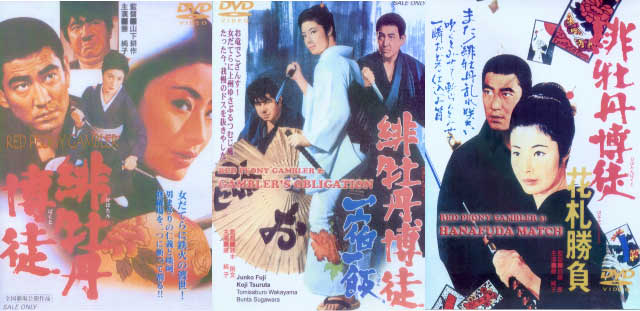
There is cool, cooler and then the Red Peony Gambler. The style she cuts
is even sharper than the short sword she uses to discourage her enemies.
This was a series of eight films that ran from 1968 through 1972 and propelled
actress Junko Fuji into stardom with her portrayal of a female gambler and
swordswoman who roams the land looking for revenge and redemption for her
family. The series was to a large extent the precursor and inspiration to
“Lady Snowblood” which began the year after this series ended, but while
that short series of two films has become legendary in the West and is easily
available “The Red Peony” series is still very unknown. That is something
that should be remedied because they are extremely well done films and enormously
satisfying.
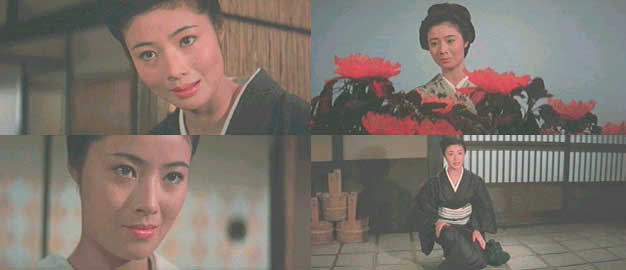
Much of this is due to the confident immaculate beauty and charisma of Junko
Fuji. She was born in 1945 and was in show business nearly from the beginning.
Her father Koji Shundo was a famous producer for Toei who was behind many
of the classic Yakuza films of the 1960’s with macho male stars Ken Takakura,
Noboru Ando and Koji Tsuruta. In high school Junko studied various arts such
as dancing, acting and singing and had the opportunity to appear on a local
TV show. Her father actually had no desire for his daughter to enter the
rough tumble of show business, but finally gave into her pleas after a Toei
director asked her to be in one of his films. Her film debut was in “Tales
of Hashu Chivalry: A Man’s Sake Cup” in 1963.
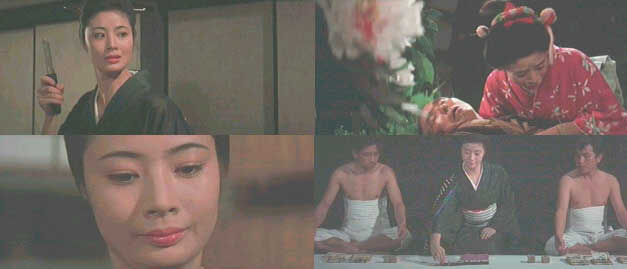
In short order she became one of Toei’s top actresses with a series of films
in which she was often paired with Tsuruta or Takakura. In most of these
she was the love interest – the loyal woman who stands by her man and often
watches him die in the end. With “Red Peony Gambler” she gained a huge following
of male fans with her alluring and yet traditional characterization – the
perfect woman who could pour tea correctly, arrange flowers and kill someone
all in the blink of an eye. In 1972 she married a well-known Kabuki actor
and performed only intermittently after that. She still acts occasionally
– in “The Geisha House” (1999), “Gege” (2004) and “Milk White” (2004), but
even more interesting is that her daughter, Shinobu Terajima, has become
an actress and was amazing in the film “Vibrator”.
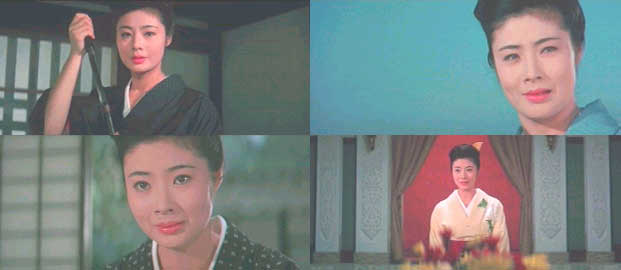
The Red Peony Gambler films take place around the turn of the century as
best as I can tell and they completely inhabit a world that would be similar
to that described in Chinese films as Jiang Hu – the Japanese underworld
of the Yakuza – and the characters who populate these films are from that
environment – gamblers, ronin, thieves, prostitutes, gang members. Like the
Jiang Hu though, there are codes and rules that are expected to be
followed in this society in the same way of polite society. In one scene
Oryu, The Red Peony has to make her case before a conference of Yakuza heads
and has this to say about the Yakuza code “Once we join the Yakuza world,
we can’t disregard the code of our profession. We live as outlaws in society
and thus must keep faith with ourselves. Otherwise we would truly be the
scum of the earth.” Though on the surface a female gambler might seem at
odds in this man's world and could be perceived as a rebellious figure, but
Red Peony is a strong traditionalist and follows the rules of social obligation
and hierarchy to the letter. Within this world there are of course those
who follow the rules and those who don’t. Tradition is looked upon as a mark
of honor - of being Japanese - while Westernization is looked upon with suspicion
in these films - in the first film the odious villain dresses in suits and
in the second film an imperious Westernized dandy is yanked from his carriage
and thrashed.
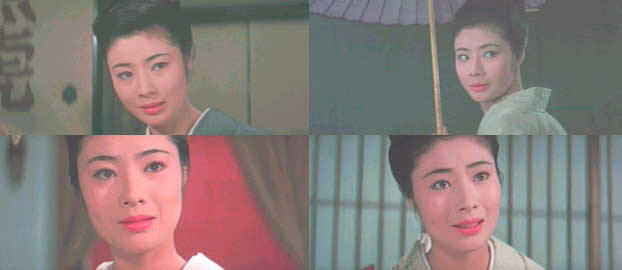
Most of the Yakuza films during the 1960’s consisted of protagonists who
follow the code of honor and this genre of film was termed “Ninkyo-Eiga”
(Chivalry Films) in which the hero places his honor to his principles, his
friends, his gang and his family above death and often finds exactly that
by the end of the film. The Red Peony films are in this tradition except
that of course the hero is a heroine and she would easily accept her death
rather than break the code of honor. The end of the series is considered
by some as the final breath of this genre as the Yakuza film moved into grittier
and more realistic territory in which these codes of honor were buried under
blood and ruthless cynicism.
With a blood red background and in a traditional kimono, Oryu delivers
a formal Yakuza introduction to the unseen head but even more so to the unseen
audience:
“I was born in Itsuki, Kumamoto. My name is Ryuko Yano. I go by
the name of Oryu, the Red Peony. As you see I’m nobody special”.
She is of the Yano family and her father was the head of a small clan
that had the gambling rights for a territory, but after he was murdered on
the street his men took the rights away from the family and left her nothing.
The father had wanted to keep his daughter out of this life and had her learn
the womanly skills of tea ceremony, sewing and flower arrangement and also
just in case sword fighting. She had been engaged to the son of a wealthy
merchant, but after the father’s death this was broken off and Ryuko was
on her own only kept company by her need to track down the killer of her
father and to reclaim the rights of the Yano family. She took on the name
of the Red Peony to remember the color of the white peonies sprayed by the
blood of her father.
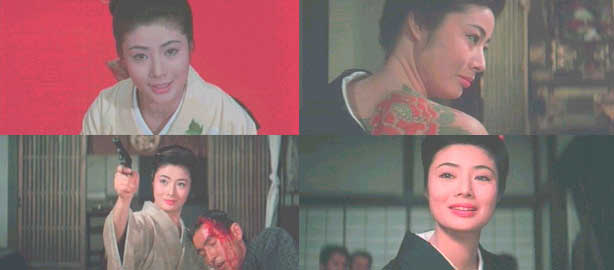
She also managed to pick up some of the family gambling skills and begins
to wander around Japan earning her keep in the gambling parlors dotted around
the country and keeping a wary eye out for some indication of whom the killer
might be. She has only a dropped wallet to identify him with. There is no
going back to her former life of being a traditional wife and to ensure this
she tattoos herself with a large blood red peony flower on her right shoulder.
This marks her as Yakuza and now no man outside of this underworld could
ever love or marry her. She is in many ways very traditional in her composure,
manners and garb, but beneath this is a ferocious need to right the wrongs
done to her family. When she began her mission she says “I’ll be a man
from now on”, but her form and beauty attract many men to her. Men though
tend to die around her – her enemies, her followers and those who love her
but she refuses to give men an inch – “Don’t underestimate me because
I am a woman” she tells one man and to another who insists that she pour
him a cup of sake “I’ve never poured a cup for a man before” as she
throws it into his face. She may feel, she may yearn for love but she has
another road to go down.
The films (at least the first three) all have the same basic formula
- Oryu finds herself in the middle of a Yakuza dispute - one side is honorable,
the other is not - and she of course sides with the honorable (and always
weaker) one. At some point a strong lone male character appears on the scene
and the two of them find common cause. In the end after being as patient
as she can be, Oryu gives a look that says it can't be put off any longer
and puts on her sword, purses her lips and goes to face the large group of
bad guys as the theme song plays during her long walk. Afterwards she moves
on to some other city and continues to build her reputation among the Yakuza
world in hopes that enough connections will allow her to rebuild her family
name.
Red Peony Gambler (Hibotan Bakuto)
Director: Kousaku Yamashita
Production Company: Toei
Year: 1968
Running Time: 98 minutes
Oryu catches the house dealer cheating with a swift hairpin launched
at his hand and forces the boss to remove one of his fingers. In doing so
she has saved the life of Fujimatsu (Kyosuke Machida) who was about to die
for declaring the game a dishonest one but being unable to prove it. She
gains a good friend, but also a number of enemies who soon track her down
on the outskirts of town and try to kill her against a bright deep sunset.
With her short sword she ably defends herself, but is still grateful for
the assistance of a wandering swordsman who goes by the name of Naoki (played
by Ninkyo-Eiga stalwart Ken Takakura) who just didn’t like the odds. As she
journeys on she overhears a conversation in which she learns that the only
loyal member of the Yano clan, Fugushin, appears to be in trouble and she
goes to see what she can do to help him.
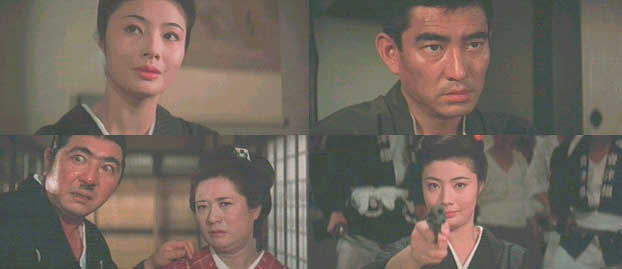
He is staying with a Clan that is headed by the bumpkinish Kumatora (Tomisaburo
Wakayama – nearly unrecognizable from his Lone Wolf character) with a penchant
for a Hitler like moustache, an eye for the ladies and blossoming red apple
cheeks. The big boss (Nobuo Kaneko) of the much larger Iwazu Clan is
pressuring his gang and a fight for territory seems inevitable. Feeling that
Fugushin is partly responsible for this state of affairs, Oryu goes to the
headquarters of the Iwazu and with pistol in hand demands to see the boss.
He reluctantly grants her an audience with a pistol aimed at his head but
she hands him the gun and asks for peace between the two groups. When he
hesitates Oryu demands that she be punished to bring peace and in a moment
of pure drama pulls down her kimono to reveal her tattoo and asks him to
shoot the Red Peony. Instead, another woman enters the room – Otaki (Nijiko
Kiyokawa) of the Osaki Doman family and takes the gun and shoots the red
peonies in the garden and tells Oryu that she reminds her of what she was
like many years previously. Oryu has made another loyal connection in the
Yakuza world and friendship in this world is a near unbreakable bond. But
not always.
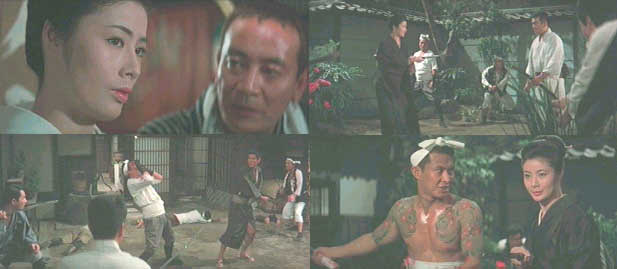
Oryu travels on to Osaka to stay with Otaki and takes along Fugushin and
Fujimatsu. Here she again feels obliged to run interference when another
Yakuza boss causes trouble for Otaki and Fujimatsu – but it turns out that
this boss Kokuai is a good friend of Naoki who had helped her before. They
are blood brothers going way back, but Naoki also realizes that his friend
is the killer that Oryu is looking for and painfully feels he must choose
friendship over justice. All these threads lead to a violent explosion of
death and redemption. Though the film has a decent quota of action, this
isn’t what makes the story so compelling – instead it’s the web of Yakuza
obligations that is built over the film and the sense of honor and duty around
them that pulls you in. And of course Junko Fuji.
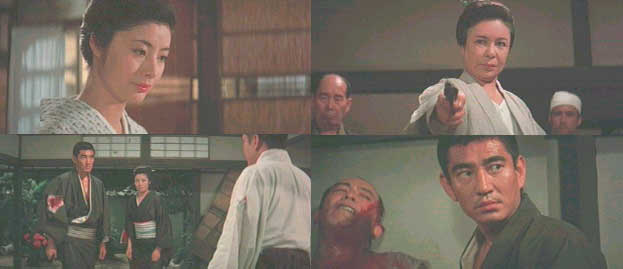
Red Peony Gambler 2: Gambler’s Obligation (Hibotan Bakuto: Isshuku
Ippan)
Director: Noribumi Suzuki
Production Company: Toei
Year: 1968
Running Time: 95 minutes
Oryu is once again a traveler on the road but she is a guest at the
home of Togasaki, the honorable head of the Yakuza in the town of Tomioka.
The film begins with a drum barrage as Oryu beats out a rhythmic pattern
as the people dance in a festival – a scene that makes you realize that the
ending of Kitano’s "Zatoichi" was not as out of time as it may have felt.
Trouble is stirring in the town as the mulberry tree growers are deeply in
debt to the local loan shark who won’t give them a break. They go to Togasaki
and ask for his help in working out a deal. Meanwhile, a gambler is having
more success than Togasaki would like at one of his betting places and he
politely asks Oryu to go and see what she can do about it. The gambler is
a woman called Oren who keeps her attire at mid-shoulder in order to display
her intricate tattoo work and wears a scowl like an army trench at Flanders
Field while her husband at her side counts their winnings. Oryu defeats Oren
in a game of chance, but this only begins to pay back the obligation she
feels she owes Togasaki.
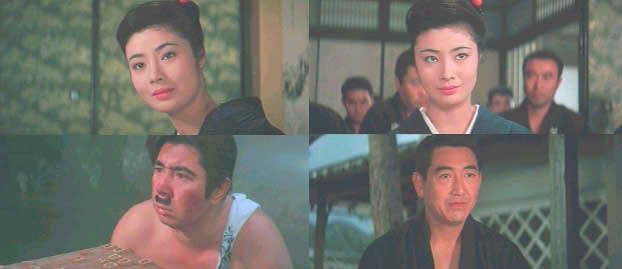
Togasaki asks her to deliver a letter to their friend Kumatora (from part
one – played by Tomisaburo Wakayama) and Kumatora's man Fujimatsu (also in
part one), but once the letter is read Oryu realizes that it was just an
excuse to get her away from danger. She soon learns that Togasaki was killed
when he tried to lead the farmers against the loan sharks – and that he was
betrayed by his main lieutenant, Kasamatsu, who then took over the gang and
forced the town’s women to work in his silk mill. Not satisfied with this,
Kasamatsu also rapes the daughter of Togasaki and tries to destroy her business.
Clearly, he and the Red Peony have much to talk about. Obligations are not
cancelled by death.
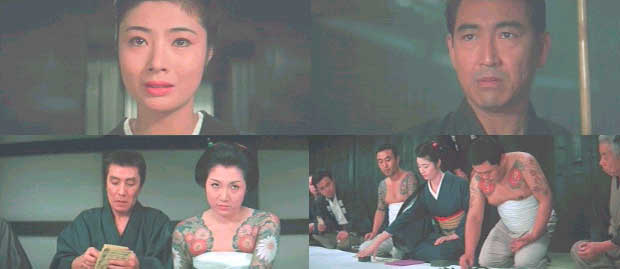
She attempts to convince the Yakuza counsel to remove the legitimacy of Kasamatsu’s
takeover, but he counters this by sending his thugs headed by a lean wiry
killer played by the cold-eyed but always fascinating to watch Bunta Sugawara
to kill Oryu. She fends off the attackers with her umbrella and some slick
judo, but has to turn to her short blade to leave some real marks to remember
her by. Out of the shadows a man comes to assist her – a poor woman seemingly
in need – he is Shutaro (Koji Tsuruta) – a chivalrous gentleman and also
a famous killer. He is returning to his hometown that he left many years
before – Tomioka it turns out and events are soon to take place here that
will have them both steeped in blood. This is a terrific sequel to the first
film – it doesn’t need to slow down to explain any background and takes off
immediately with a flurry of interesting characters, vivid colors and amped
up violence. Director Norifumi Suzuki was to gain some fame within a few
years for his pinku films like “Convent of the Sacred Beast”, “Beautiful Girl
Hunter” and a few of the “Sukeban” series. He also wrote a few of the other
Red Peony scripts.
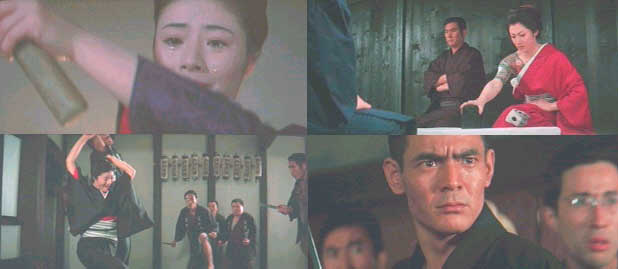
Red Peony Gambler 3: Flower Cards Game (Hibotan Bakuto: Hanafuda Game)
Director: Tai Kato
Production Company: Toei
Year: 1969
Running Time: 98 minutes
Oryu finds herself again having to choose sides in a deadly face off
between rival Yakuza gangs in Nagoya. She arrives at the house of Nishinomaru
with a letter of introduction from Kumatora (Tomisaburo Wakayama) and formally
asks for hospitality from the head of the clan, Sugiyama (the dour faced
Kanjuro Arashi), but she is accused of being a cheat by his followers. Apparently,
a woman is going about the country claiming to be the Red Peony and taking
people in games of chance. Sugiyama believes her protests of innocence and
takes her into his house – she is of course now obligated for his kindness.
When Oryu comes across the impersonator later she realizes that she is the
same woman whose blind child she had earlier saved from an oncoming train
and so allows the woman to escape from a number of men who wish to do her
harm. This act of kindness is later repaid to the fullest. Sugiyama is at
odds with the corrupt Kimbara who is in league with some politicians to take
away certain gambling rights of the Nishinomaru family – what Sugiyama doesn’t
know is that his son Jiro (Ritsu Ishiyama) is in love with the step-daughter
of Kimbara and this fact soon brings the simmering issues to a bloody boil.
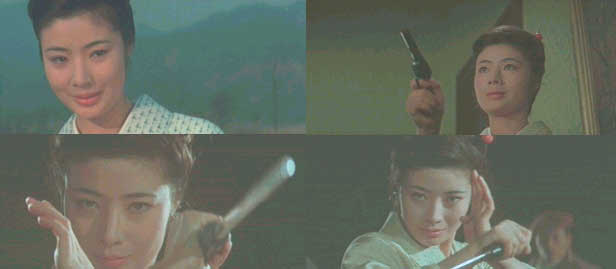
When Jiro learns that Kimbara is marrying off Yae to curry favor he goes
to him and puts his life on the line in a game of dice – he loses and Kimbara
tells Oryu who has intervened that he will kill Jiro at midnight unless he
receives 2,000 Yen. Another character enters the mix – the wandering gambler
Shugo (Ken Takakura) who is staying with Kimbara and as an honorable Yakuza
he feels obligated to assist his host. When Shugo and Oryu meet they recognize
each other as kindred souls but are also in opposite camps in the inevitable
conflict that is coming. Eventually, Kimbara pushes his luck too far and
Oryu begins her traditional walk to his headquarters with her sword at her
side as well as her loyal friend Fujimatsu to do what has to be done – kill
everyone.
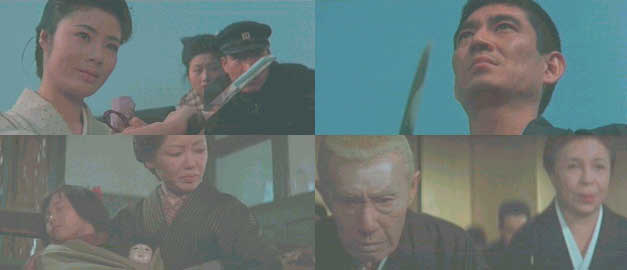 A number of other familiar characters show up as well – Kumatora displays
a less comic side (and a less comic moustache) as he savagely defends Oryu’s
honor on one occasion and Oryu’s friend from the first episode – the female
gang leader Otaki (Nijiko Kiyokawa) – makes an appearance. What can cause
some minor confusion is the reappearance of some actors from earlier episodes
– Takakura for example – who are playing different characters. By the third
episode in the series the main formula is well in place and that makes parts
of the film somewhat predictable but no less satisfying – in fact knowing
the big showdown is just a matter of time makes the build up all that much
more enjoyable. Most rewarding in this film is simply watching the various
plot threads come together and the well-drawn characters that inhabit this
world. The action tends to be short and swift until the final confrontation
in which blood flows freely.
A number of other familiar characters show up as well – Kumatora displays
a less comic side (and a less comic moustache) as he savagely defends Oryu’s
honor on one occasion and Oryu’s friend from the first episode – the female
gang leader Otaki (Nijiko Kiyokawa) – makes an appearance. What can cause
some minor confusion is the reappearance of some actors from earlier episodes
– Takakura for example – who are playing different characters. By the third
episode in the series the main formula is well in place and that makes parts
of the film somewhat predictable but no less satisfying – in fact knowing
the big showdown is just a matter of time makes the build up all that much
more enjoyable. Most rewarding in this film is simply watching the various
plot threads come together and the well-drawn characters that inhabit this
world. The action tends to be short and swift until the final confrontation
in which blood flows freely.
My rating for the series: 8.0
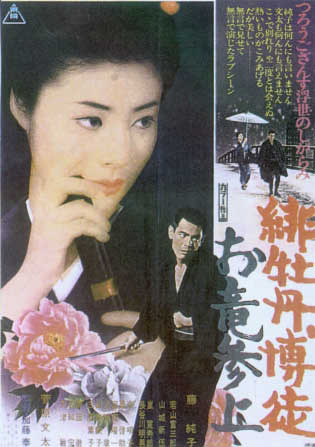
Red Peony Gambler 6: Oryu's Visit (1970)















